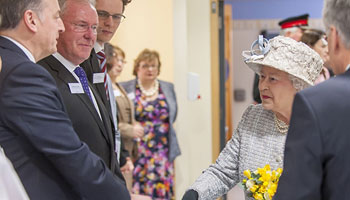 On 5 February Her Majesty The Queen officially opened a £3 million MRI suite housing two new GE Healthcare MR scanners at The Queen Elizabeth Hospital, King's Lynn, UK. The facility is expected to help significantly improve local diagnostic facilities for patients. This was Her Majesty The Queen’s first official visit to the hospital since 2008.
On 5 February Her Majesty The Queen officially opened a £3 million MRI suite housing two new GE Healthcare MR scanners at The Queen Elizabeth Hospital, King's Lynn, UK. The facility is expected to help significantly improve local diagnostic facilities for patients. This was Her Majesty The Queen’s first official visit to the hospital since 2008.
The MRI scanner suite has been open to the public since May 2012. The two GE Healthcare scanners installed at the facility, the Optima MR360 1.5T and the Optima MR450w with GEM Suite will help increase capacity for scans, predicted to increase from an annual 6,600 in 2008 to 13,000 per annum within the next few years.
The Optima*MR450w with GEM Suite has been designed with patient comfort in mind. In particular, the area where the patient lies is wider than in many conventional scanners. In addition, flexible ‘Geometry Embracing Method (GEM)' coils follow the contours of the patient’s body, allowing easier patient positioning and making for a more relaxed scanning experience. This also makes it easier for radiographers to correctly position their patients leading to a higher quality diagnostic image.
The Optima*MR360 also combines clear image quality with versatile and user-friendly features, which make it possible to produce high quality images even when scanning challenging areas such as breasts, the heart and blood vessels. It is also energy efficient, using up to 34 percent less power than previous generation MR systems.
Karl Blight, General Manager of GE Healthcare UK & Ireland, who was introduced to the Queen explained: "GE Healthcare scanners are a key part of the state of the art suite at The Queen Elizabeth Hospital and we are pleased to be part of delivering diagnostic facilities for patients here."
Barbara Cummings, Director of Planning and Performance from The Queen Elizabeth Hospital King's Lynn NHS Foundation Trust said: "We chose GE Healthcare technology for our new MRI scanner suite as we have been impressed by the quality of the images their scanners produce and the more relaxed patient experience they allow. The Optima*MR360 1.5T and Optima*MR450w will also make it possible to carry out breast and heart scans, significantly improving the diagnostic facilities for patients in this area."
The Optima*MR360 and the Optima*MR450w with GEM Suite are two products in GE Healthcare's MR portfolio focused on humanizing MR. While the MR industry typically hasn't put people first, GE Healthcare is working to change that by continuing to develop solutions for patients of differing ages, body types, and disease symptoms.
Related news articles:
- GE Healthcare's Profile
About GE Healthcare
GE Healthcare provides transformational medical technologies and services that are shaping a new age of patient care. Our broad expertise in medical imaging and information technologies, medical diagnostics, patient monitoring systems, drug discovery, biopharmaceutical manufacturing technologies, performance improvement and performance solutions services help our customers to deliver better care to more people around the world at a lower cost. In addition, we partner with healthcare leaders, striving to leverage the global policy change necessary to implement a successful shift to sustainable healthcare systems.
Our "healthymagination" vision for the future invites the world to join us on our journey as we continuously develop innovations focused on reducing costs, increasing access and improving quality around the world. Headquartered in the United Kingdom, GE Healthcare is a unit of General Electric Company (NYSE: GE). Worldwide, GE Healthcare employees are committed to serving healthcare professionals and their patients in more than 100 countries.